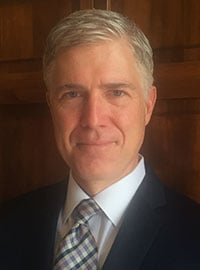 Last week, I provided an overview of Judge Gorsuch’s decisions involving the NLRB. This week, I take a deeper dive into the opinions, discussing a few of the holdings below.
Last week, I provided an overview of Judge Gorsuch’s decisions involving the NLRB. This week, I take a deeper dive into the opinions, discussing a few of the holdings below.
As noted in my last post, Judge Gorsuch’s most recent opinion is actually a dissent. It offers the most interesting insights about his view of the NLRB’s authority. A remedial question under the NLRA was at issue in the case, Community Health Services v. NLRB. Specifically, the NLRB had determined that the employer unlawfully reduced the work hours for a group of employees. But, the employees were not fired.
The NLRB held that the employees’ interim earnings — the amount of money the employees earned from sources other than the employer during the time that their hours were reduced — would not be off-set from the back pay the NLRB awarded to the employees. This holding departed from the NLRB’s rule applicable to termination cases, where such interim earnings do offset the back pay owed to the employees.
While the majority would have affirmed the NLRB’s decision, Judge Gorsuch disagreed. In adopting a different rule for hours reduction cases, he wrote in his dissenting opinion, the NLRB failed to live up to three, settled legal principles, namely that federal agencies (i) “must take care to respect boundaries of their congressional charters,” (ii) may not “treat similarly situated classes of persons differently without a rational explanation,” and (iii) may not “depart from their own existing rules and precedence without a persuasive explanation.” Judge Gorsuch concluded that the NLRB exceeded its statutory authority and offered none of the requisite explanations.
By contrast, in other cases involving the NLRB, the party’s challenge was to the NLRB’s factual finding that the party had violated the NLRA. In these cases, Judge Gorsuch applied a more deferential standard of review known as “substantial evidence.” The Tenth Circuit, sometimes with Judge Gorsuch authoring the opinion of the court, uniformly upheld the NLRB’s decision using this standard.
Here is how Judge Gorsuch explained the standard or review in one case:
[O]ur job is something like the role of the instant-replay booth in football: the call on the field presumptively stands and we may overturn it only if we can fairly say that no reasonable mind could, looking at the facts again, stand by that call. So it is that we, like the instant-replay official, often affirm decisions that we might not have made ourselves.
Thus, Judge Gorsuch voted to uphold the NLRB’s decision in cases involving:
- An employer’s termination of (and failure to hire) union “salts”: individuals who obtained (or wanted to obtain) a job at the employer in order to organize its employees;
- An employer’s failure to respond to union information requests arising out of grievance processing;
- A union’s unlawful threat of, and request for, termination of a bargaining unit member for non-payment of union dues (this is the case from which the quote above comes); and
- A union’s unlawful treatment of a member in connection with its hiring hall.
Finally, in one of the closest comparisons to Chief Judge Garland, Judge Gorsuch had an opportunity, following the Noel Canning ruling, to address whether Member Becker’s recess appointment was unlawful. Chief Judge Garland had ruled that it was not. Judge Gorsuch discussed the issue, observing at one point that “there seems little reason to doubt the validity of the appointment before us and the power of the Board to issue the order under review.” Ultimately Judge Gorsuch didn’t decide the issue, however, observing that neither of the parties in the case before the court questioned the NLRB’s authority.
So, what is my takeaway? Based on the decisions in which Judge Gorsuch participated, it is fair to say that he certainly has some skepticism of the NLRB’s interpretation of the NLRA in certain cases. However, it also seems clear that on questions involving “run-of-the-mill” NLRB decisions, i.e., the application of factual determinations to settled agency interpretations, Judge Gorsuch is not shy about deferring to the NLRB’s decision.
